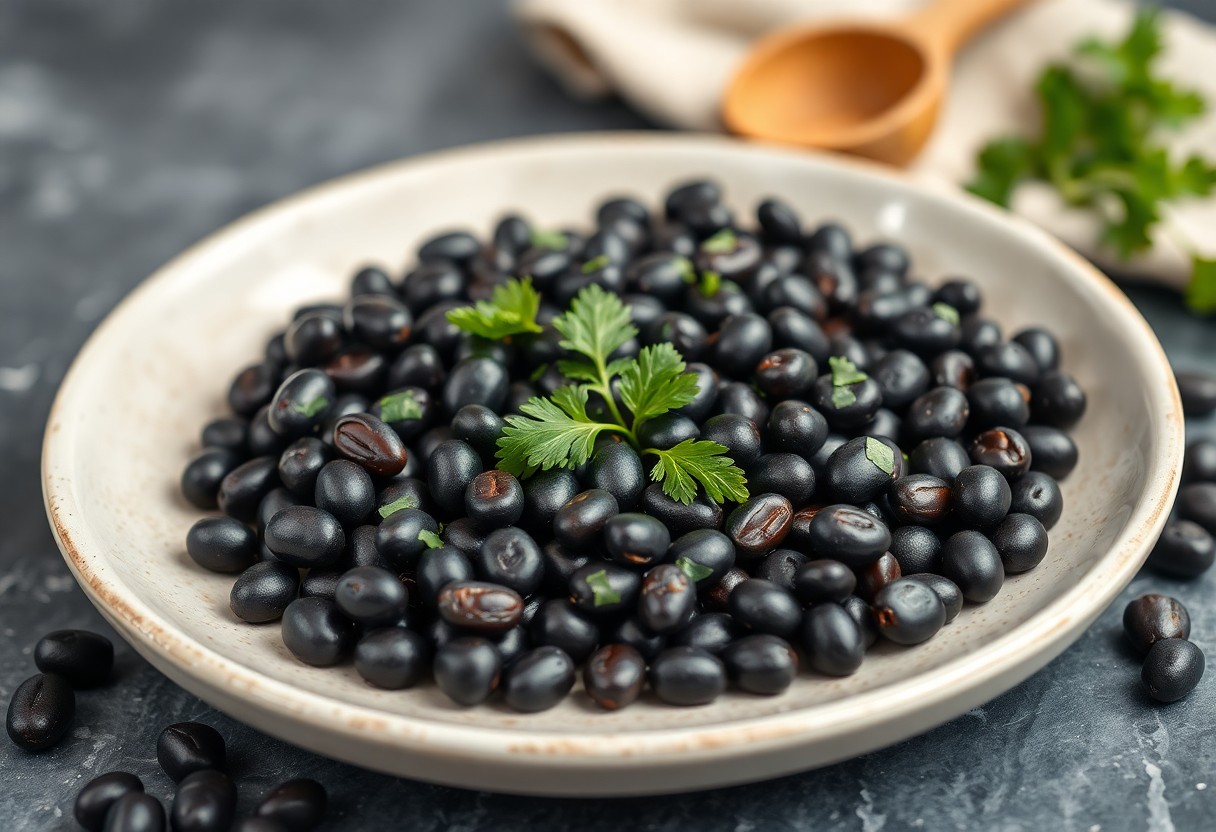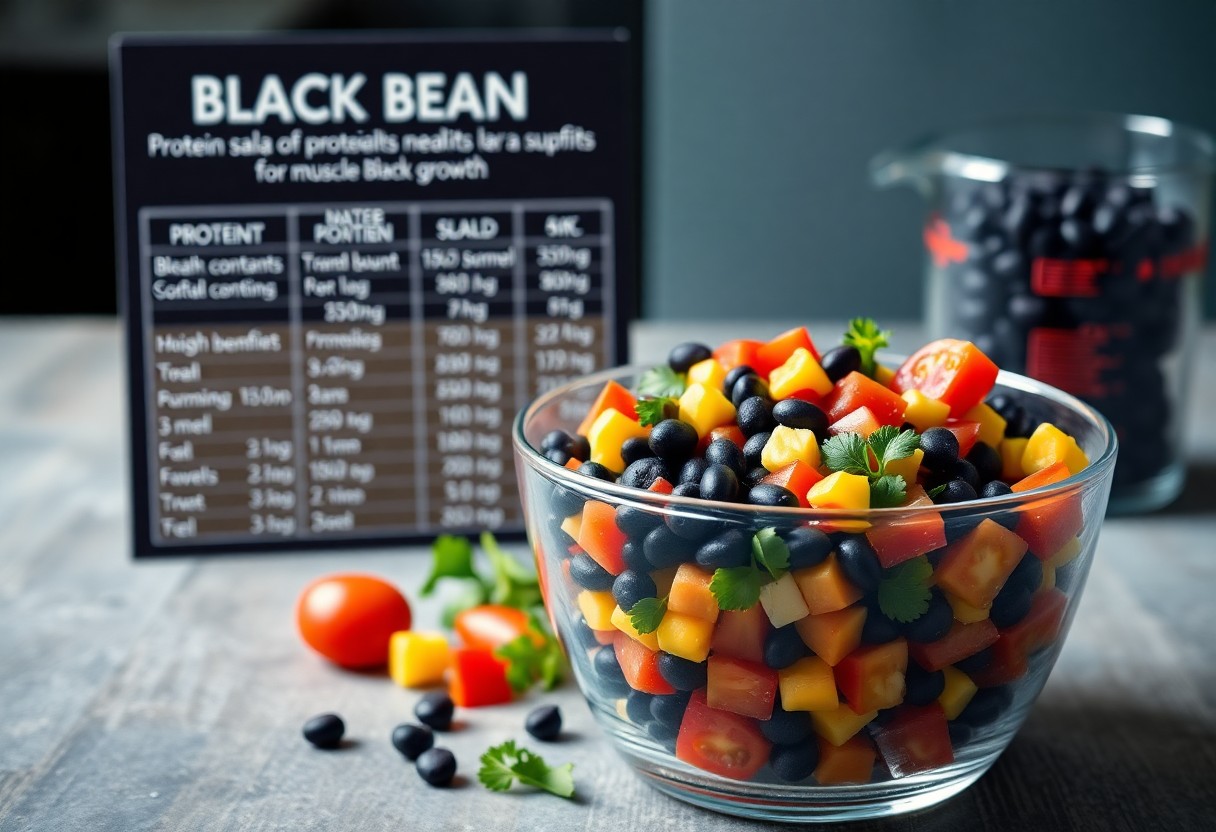It’s crucial to understand the protein content of black beans as part of your diet, especially if you are focused on muscle growth. Rich in protein and other nutrients, black beans can play a significant role in your fitness regimen. Incorporating these legumes not only enhances your meals with flavor but also provides numerous health benefits that support your fitness goals. Explore the Black Bean Benefits - Primary Care in Rochester and Kasson to learn more about how they can nourish your body.

Key Takeaways:
- Black beans are a rich source of plant-based protein, providing approximately 15 grams of protein per cooked cup.
- They contain vital amino acids, making them a beneficial addition to the diets of athletes and those looking to build muscle.
- In addition to protein, black beans are high in fiber, vitamins, and minerals, supporting overall health and digestion.
Nutritional Profile of Black Beans
Black beans are not only a delicious addition to your meals, but they also boast an impressive nutritional profile. A single serving typically contains about 15 grams of protein, 15 grams of fiber, and a variety of vitamins and minerals, making them a powerhouse for muscle growth and overall health. For detailed Black Beans Nutrition Facts, you can explore further their benefits.
Protein Content per Serving
A standard 1-cup serving of cooked black beans offers roughly 15 grams of protein. This plant-based protein source is excellent for muscle repair and growth, complementing your workout regimen and enhancing your overall diet.
Essential Amino Acids
While black beans are a great source of protein, they also contain vital amino acids your body needs. However, they lack sufficient quantities of methionine, making it beneficial to pair them with grains or nuts for a complete protein profile.
Black beans provide nearly all vital amino acids, but they are particularly low in methionine. To optimize your protein intake, consider combining them with whole grains like brown rice or quinoa, which are higher in methionine. This strategy not only enhances the protein quality but also ensures you receive a balanced intake of nutrients vital for muscle recovery and growth.Health Benefits of Black Beans
Incorporating black beans into your diet offers various health benefits that go beyond just protein content. These legumes are rich in fiber, antioxidants, and imperative minerals, all of which contribute to improved digestion, enhanced heart health, and better blood sugar control. By including black beans, you're supporting not only muscle recovery but also overall well-being, making them a powerhouse addition to your meals.
Muscle Growth Support
Black beans provide a significant protein source, vital for muscle growth and repair. Each cup contains about 15 grams of protein, along with amino acids necessary for building muscle tissue. The combination of fiber and protein helps to keep you full and fuels your workouts, allowing for improved performance and recovery.
Overall Health and Wellness
Black beans offer numerous health benefits, impacting various aspects of wellness. They are high in fiber, which aids in digestion and helps maintain a healthy gut. Their rich antioxidant content supports heart health by reducing inflammation and lowering cholesterol levels. Additionally, minerals like magnesium and iron play roles in energy production and muscle function, keeping you vibrant and active.
Comparison with Other Protein Sources
Black beans present a robust protein alternative compared to other sources. While they are plant-based, their protein content exceeds that of some animals in certain portions, offering a nutritious choice for muscle growth. You can explore more about legume options in The 9 Healthiest Beans and Legumes You Can Eat.
Protein Comparison| Source | Protein per 100g |
|---|---|
| Black Beans | 21g |
| Chicken Breast | 31g |
| Tofu | 8g |
| Eggs | 13g |
Plant-Based Proteins
Plant-based proteins like black beans offer not just protein but also fiber, vitamins, and minerals. They help in muscle recovery and maintain energy levels during workouts. With minimal fat, they fit perfectly into your fitness-oriented diet, allowing you to fuel your body while supporting overall health.
Animal-Based Proteins
Animal-based proteins such as chicken, beef, and fish boast higher protein quality and necessary amino acids, critical for muscle repair and growth. While they typically contain more protein per serving, they often come with saturated fats, requiring you to balance between sources for optimal health.
Animal-based proteins provide complete amino acid profiles, necessary for muscle synthesis. For instance, lean meats like turkey and fish are renowned for supporting high-intensity training, quickly aiding muscle recovery. These proteins can be particularly advantageous if you're engaging in rigorous workouts, as they deliver the concentrated nutrients your body craves for efficient energy utilization and stronger performance.

Ways to Incorporate Black Beans into Your Diet
Integrating black beans into your meals can be simple and enjoyable. You can add them to salads, soups, or stews for extra texture and flavor. They pair well with grains like rice or quinoa, and can also be mashed for spreads or dips. Try incorporating black beans into tacos, burritos, or even smoothies for a nutritious boost.
Recipes and Meal Ideas
Delight in a variety of recipes featuring black beans. Consider a black bean and corn salad, rich in vitamins and fiber, or prepare a hearty black bean chili with spices for a warming dish. You can also enjoy black bean burgers, which serve as a delicious and filling plant-based alternative to traditional meat burgers.
Preparation Tips
To make the most of black beans, soak dry beans overnight to enhance texture and reduce cooking time. Rinse canned beans thoroughly to remove excess sodium. Cook beans with herbs or spices to infuse flavor, and blend them into dips for a variety of uses. You can also freeze cooked beans in portions for quick meal prep.
- Soak dry beans for better digestibility.
- Rinse canned beans to cut down sodium intake.
- Add herbs and spices for enhanced flavor.
- Freeze cooked beans for convenience.
- Recognizing the versatility of black beans in various dishes makes meal planning easier.
Considering the preparation of black beans, ensure you use fresh ingredients to maximize their nutritional value. Cooking them with onions, garlic, or bell peppers not only enhances flavor but also boosts nutrient content. If using canned beans, be aware of the expiration date and always check for spoilage before use.
- Utilize fresh herbs and spices for optimal nutrition.
- Store soaked beans in the refrigerator to keep them fresh.
- Experiment with different cooking methods such as grilling or baking.
- Plan meals around seasonal fruits and vegetables.
- Recognizing the health benefits of proper preparation can elevate your culinary experience.
Potential Nutritional Drawbacks
Despite their numerous benefits, black beans can present some nutritional drawbacks. For individuals not accustomed to high-fiber diets, the fiber content in black beans—nearly 15 grams per cup—can lead to gastrointestinal discomfort. Furthermore, they contain antinutrients like phytic acid, which may inhibit the absorption of certain minerals like iron and zinc if consumed in excess.
Digestive Considerations
The high fiber content in black beans can be both a blessing and a challenge. While fiber promotes digestive health, it may cause bloating or gas, especially if your body isn't used to it. Gradually incorporating black beans into your diet can help mitigate these digestive issues.
Nutrient Absorption
Antinutrients in black beans can affect the absorption of necessary minerals. While they are packed with nutrients, compounds like phytic acid can bind to minerals such as iron and zinc, making them less bioavailable. Cooking beans thoroughly and soaking them beforehand can significantly reduce these antinutrients and enhance nutrient absorption.
For effective nutrient absorption, consider pairing black beans with vitamin C-rich foods, like bell peppers or citrus fruits. This combination not only enhances iron absorption but also enriches your meal's nutritional profile. Additionally, including a variety of foods in your diet can offset the potential mineral absorption issues posed by antinutrients in black beans, ensuring you meet your daily nutritional requirements.
Summary of Key Points
Nutritional Profile
Black beans boast an impressive protein content, averaging around 15 grams per cup when cooked, making them an excellent plant-based protein source to support your muscle growth goals. Alongside protein, they provide 15 grams of fiber, enhancing digestive health and keeping you satiated.
Health Benefits
The rich antioxidant properties in black beans may reduce inflammation and oxidative stress, contributing to overall wellness and recovery post-exercise. Their low glycemic index aids in maintaining stable blood sugar levels, important for athletes and active individuals.
Incorporation Strategies
Incorporating black beans into your diet can be effortless. Consider blending them into smoothies, tossing them in a salad, or mixing them into healthy burritos, all of which can enhance flavor and nutritional value without additional effort.
To wrap up
Taking this into account, incorporating black beans into your diet can significantly enhance your protein intake, supporting your muscle growth goals. With their rich nutritional profile, packed with important amino acids, fiber, and vitamins, black beans can serve as a valuable addition to your meals. Understanding their health benefits can empower you to make informed dietary choices that align with your fitness aspirations, ultimately helping you optimize your performance and recovery.
FAQ
Q: What is the protein content in black beans?
A: Black beans contain approximately 15 grams of protein per cooked cup (172 grams).
Q: How do black beans contribute to muscle growth?
A: Black beans provide high-quality plant-based protein, necessary amino acids, and carbohydrates, supporting muscle repair and growth after exercise.
Q: What other nutrients are present in black beans?
A: In addition to protein, black beans are rich in fiber, iron, magnesium, and antioxidants, which contribute to overall health and muscle function.
Q: Can black beans be part of a muscle-building diet?
A: Yes, black beans can be incorporated into a muscle-building diet as a protein source, especially for vegetarians and vegans.
Q: How should black beans be prepared for optimal nutrition?
A: Soaking and cooking black beans properly enhances their digestibility and nutrient absorption, making them more beneficial for health and muscle growth.

0 Comments